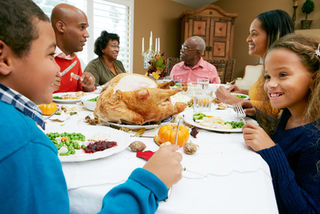Gratitude
Why It's Hard to Be Thankful on Thanksgiving
Surprising new survey reveals what prevents people from experiencing gratitude.
Posted November 21, 2015

The research is clear—gratitude is a superpower. Grateful people enjoy benefits such as improved physical and emotional health, better relationships, higher self-esteem, and longer lifespans.
Despite the benefits of gratitude, many people aren’t grateful—not even on Thanksgiving—according to a surprising new survey. The survey, which was conducted by the Harris Poll on behalf of American Greetings, sheds light on why people aren’t thankful during the holiday season.
Three in five Americans say they’d rather do something else rather than reflect on what they’re thankful for on Thanksgiving. Top activities respondents gave priority over being thankful included watching football, watching streaming media, reading a book, or spending time with a pet.
Holiday Stress Outweighs Gratitude
A whopping 71% of Americans say the holidays cause them stress. When asked about their sources of stress, shopping for gifts topped the list. Spending time with family was a close second, followed by cooking big holiday meals.
Despite the acknowledgement of the lack of gratitude, 92% of Americans believe the holidays are a time to say thanks to friends and family. Yet, one in five confess they tend to be more thankful for material possessions than people.
Lack of gratitude toward family isn’t the only problem. Twelve percent of Americans admitted they would rather spend time on their smartphones than have a meaningful conversation with family.
How to Experience a Little More Gratitude this Season
If you’re likely to get caught up in the whirl of cooking, shopping, and wrapping this holiday season, take steps to reduce your stress and increase your gratitude. Here are a few tips to help you experience reduced stress and increased gratitude over the holidays:
- Acknowledge your values. TV commercials, magazine pictures, and holiday movies portray the ideal holidays, complete with loving family gatherings and delicious meals. If you’re not careful you can easily lose sight of what’s important. Pause long enough to consider what really matters to you this year and commit to living according to those values.
- Aim for good, not perfect. The holidays don’t need to become a contest over who spends the most money or who bakes the best dessert. Give yourself permission to cook one less entree, decorate one less room, or buy one less gift this year.
- Set limits on how you spend your time. Before you declare you have to attend that holiday party, or you have to spend the day decorating, remind yourself it’s a choice. Recognizing you have control over how you spend your time—and who you spend it with—can help you keep your attitude in check. Skipping out on a few activities, may help you feel a lot less stressed.
- Say one thing you’re grateful for every day. Commit to saying one thing you feel grateful for every day. Make it a habit to express gratitude during the holiday season and you might decide to keep it up year-round.
- Send gratitude cards. Send a card that tells individuals why you are grateful to have them in your life. Send one card per day, and don’t worry about getting cards delivered for the holidays. A card that arrives a month or two after the holiday with a personalized note that expresses your gratitude will be more meaningful than a signature slapped on a generic holiday card that arrives on Christmas Eve.
- Reflect for just 60 seconds a day. Feeling thankful doesn’t have to take up a lot of time. Set aside one minute a day to notice just a few good things you have in your life. Clean water to drink, a roof over your head, or spare change in your piggy bank are just few of the things some people won’t ever experience.
Gratitude is the secret to surviving holiday stress. Rather than worry about getting gifts and checking off your holiday to-do list, focus on showing appreciation for what you already have.

Want to learn more about the bad habits that are holding you back? Pick up a copy of 13 Things Mentally Strong People Don't Do, a bestselling book that is being translated into more than 20 languages.
Interested in learning more about mental strength? Sign up for my eCourse Mental Strength: Mastering the 3 Core Factors.


